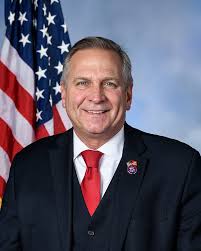
House VA Committee Chair Rep. Mike Bost (R-IL)
WASHINGTON, DC — Legislators are accusing VA of crying wolf after a recent budget update revealed that the department did not need $3 billion in supplemental benefits funding after all and that it might not be facing a healthcare funding shortfall next year, either.
VA officials said the supplemental funding was necessary because of the very real chance of a shortfall, which would have put a halt to all benefits payouts. House committee leaders, on the other hand, pointed to this is as further signs of fiscal mismanagement within the agency.
In July, VA informed Congress that the department was projecting two distinct budget shortfalls due to the large number of veterans entering the VA system in the last year. The first was the $3 billion benefits shortfall, which would come due at the end of the fiscal year. Congress passed a bill providing supplemental funding to cover that shortage in September.
The second projected shortfall was more substantial—$12 billion on the VHA side of the ledger, which VA said was needed for increased hiring and to cover the rising prices of pharmaceuticals and medical devices. That shortfall might also have been overestimated, VA officials told Congress.
VA’s budget update released at the end of October showed, however, that the VBA carried a more than $5.1 billion surplus from FY 2024. This includes the supplemental funding appropriated by Congress in September.
The briefing document provided to Congress stressed how narrow the margins were this year. For example, last year the carryover was $17 billion. This year, without the supplemental funding, the carryover in VA’s compensation and pensions account would have been approximately 1.2% of total obligations.
“While the supplemental funding was not immediately utilized, it was critical we had this funding on hand, because if we had been even $1 short on September 20, we could not certify our payment files and more than seven million veterans and survivors would have had delays in their disability compensation, pension, and education benefits on October 1,” VA officials explained in the update.
VA is also now projecting that it will not face the $12 billion healthcare funding shortfall in 2025. According to the budget update, VA will be carrying over funds in that account, as well.
“The cost of our workforce was lower than expected, we limited purchases of new equipment compared to what had been anticipated, and community care only grew at the rate anticipated by the [original] FY 2025 budget request,” the update stated.
The department is still asking for supplemental funding, noting that many of the belt-tightening measures that allowed VA to stay within its budget are not sustainable in the long term.
“VA cannot continue to delay medical equipment purchases year over year,” the update explained. “[And] we need to strategically hire approximately 5,000 additional employees in high growth areas, such as mental health.”
House committee leaders responded by accusing VA of budget mismanagement, going so far as to suggest this was done for political purposes.
“This latest stunt is not just an accounting error—Congress passed, and the president signed into law nearly 3 billion additional taxpayer dollars because this administration’s handpicked VA leaders repeatedly told us that benefits funding was on the verge of running out and veterans could be harmed,” said House VA Committee Chair Rep. Mike Bost (R-IL). “But it turns out that was never true. VA has told us, less than one week out from an election, that they had more than a $2 billion cushion, and veterans’ benefits were never going to be affected.”
Bost promised that the committee would be launching a full investigation and, in a letter to VA Secretary Denis McDonough, requested that VA “preserve any and all documents and records of communication” pertaining to the projected shortfalls.

